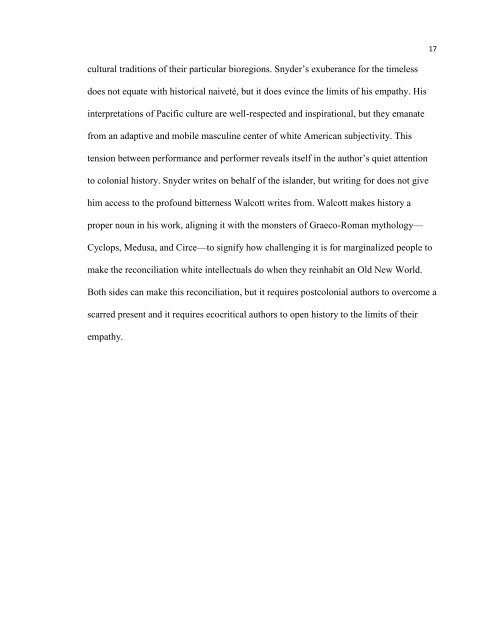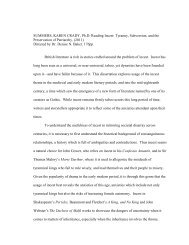RE-INHABITING THE ISLANDS - The University of North Carolina at ...
RE-INHABITING THE ISLANDS - The University of North Carolina at ...
RE-INHABITING THE ISLANDS - The University of North Carolina at ...
You also want an ePaper? Increase the reach of your titles
YUMPU automatically turns print PDFs into web optimized ePapers that Google loves.
17<br />
cultural traditions <strong>of</strong> their particular bioregions. Snyder‘s exuberance for the timeless<br />
does not equ<strong>at</strong>e with historical naiveté, but it does evince the limits <strong>of</strong> his emp<strong>at</strong>hy. His<br />
interpret<strong>at</strong>ions <strong>of</strong> Pacific culture are well-respected and inspir<strong>at</strong>ional, but they eman<strong>at</strong>e<br />
from an adaptive and mobile masculine center <strong>of</strong> white American subjectivity. This<br />
tension between performance and performer reveals itself in the author‘s quiet <strong>at</strong>tention<br />
to colonial history. Snyder writes on behalf <strong>of</strong> the islander, but writing for does not give<br />
him access to the pr<strong>of</strong>ound bitterness Walcott writes from. Walcott makes history a<br />
proper noun in his work, aligning it with the monsters <strong>of</strong> Graeco-Roman mythology—<br />
Cyclops, Medusa, and Circe—to signify how challenging it is for marginalized people to<br />
make the reconcili<strong>at</strong>ion white intellectuals do when they reinhabit an Old New World.<br />
Both sides can make this reconcili<strong>at</strong>ion, but it requires postcolonial authors to overcome a<br />
scarred present and it requires ecocritical authors to open history to the limits <strong>of</strong> their<br />
emp<strong>at</strong>hy.
















